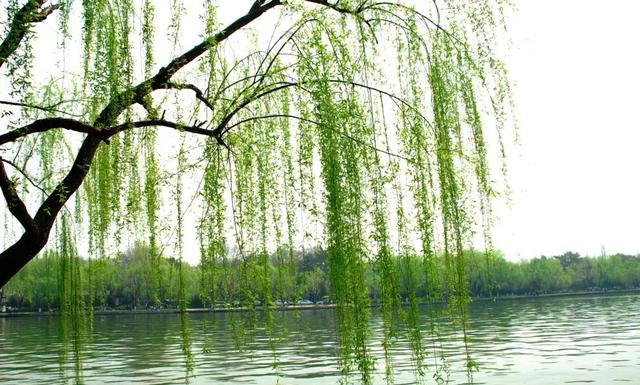The spring equinox rain foot drops softly, and the willow bank oblique wind brings the guests home.
The season is late in the north, and it can be known that there is green waist fat earlier.
This is the spring equinox season written by the Song Dynasty poet Xu Xuan. At this time, a light rain fell on the world, and the green willows swayed and danced in the spring wind. Spring in the north comes later, while in the south it is already a spring scene of grass warblers flying and willow green flowers.

The ancient literati seem to have a special preference for spring, and they praised spring, enjoyed spring, hurt spring, and sighed spring, composing a song of praise for spring.
In this poetic spring equinox season, we may wish to enjoy the "Chang'an Spring Hope" written by the Tang Dynasty scholar Lu Lun, and feel the poet's state of mind in the face of unusual people in the face of spring.
The east wind blows and rains through the green mountains, but looks at a thousand grasses.
When will home arrive in the dream, and how many people on the spring river will return?
Kawahara is surrounded by floating clouds, and the palace is jagged.
Whoever reads confucianism in the face of world difficulties will be a fading sideburn Qin Guan.
When Lu Lun wrote this poem, he was no longer young, but an old man with white hair. At this time, he was both depressed and haggard, wandering alone in a foreign country, lonely, and his life experience also set the tone of this poem's sadness and melancholy.
Through the title of this poem, we know that the poet was living in Chang'an City at this time, but his hometown was in Shanxi. When homesick, you can only look east and stare in the direction of your hometown.
At this time, a gust of east wind blew, and for the poet, this east wind blew from the direction of his hometown, which naturally deepened his homesickness.
The poet ascended to the far horizon and saw the stacks of houses in Chang'an City, and also saw the spring colors, green trees, green grasses, and red flowers in Chang'an City.
The poet directly expressed homesickness. In reality, I can't go back to my hometown, and I can only realize this wish in my dreams. Winter to spring, boats on the river shuttle back and forth, but how many people can really go home?
Neck link, the poet began to imagine the dusk of his hometown at this time. On the outskirts of Chang'an City, there are many rivers, crisscrossing and crisscrossing, seemingly extending all the way beyond the floating clouds, as the poet Wang Wei wrote in the "Han River Linpan": "Outside the rivers and the earth, the mountains are in the middle", but Wang Wei wrote more Zen.
Inside Chang'an City, the palaces are scattered and shrouded in a remnant of the sun, which makes people feel a little depressed and sad.
At the end of the link, the poet lamented his thoughts of being born in a chaotic world and looking forward to returning to his hometown, thinking of his bumpy life, and his heart could not help but begin to pity himself.
The Tang Poetry Commentary has commented on this poem: "This Chang'an was caused by the Tubo Rebellion, and Emperor Daizong was fortunate to be shaanxi, and Lun Shi was composed in Beijing. “